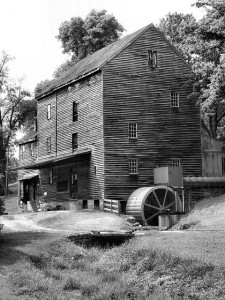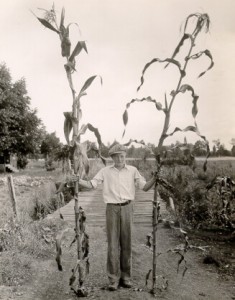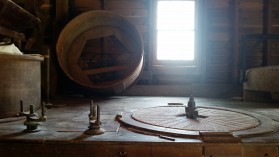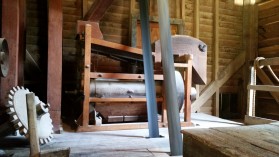Woodson’s Mill
Last Saturday we journeyed down to Lowesville, Virginia to pay a visit to Woodson’s Mill. It has the distinction of being the one of the last remaining historic mills in commercial  operation and upholds tradition with great aplomb. The mill has been home to a number of families since its erection in 1794. One its most notable owners, Dr. Julian B. Woodson, was once State Senator to Virginia.
operation and upholds tradition with great aplomb. The mill has been home to a number of families since its erection in 1794. One its most notable owners, Dr. Julian B. Woodson, was once State Senator to Virginia.
“Our philosophy is pretty simple. We believe that great ingredients make great food. Fresh, local, corn makes the best grits. When you stone-grind them slowly in a water-powered mill with nothing else added, they get even better. That’s why Woodson’s Mill meals and flours are made the same way they were in 1794.” – William Brockenbrough
Nestled in Virginia’s rolling farmland and alongside the Piney River, this idyllic, beautifully preserved landmark relies on the community for its livelihood. The waters of the Piney River power the mill itself, while the labor of neighboring farmers supplies heirloom buckwheat, red wheat, and corn. “Hickory King” corn, an heirloom variety that originated in Appalachia in the early 1800s, is a favorite in the hills of central Virginia and boasts a height of about 12 feet. Woodson’s Mill stone-grinds “Hickory King” into their crowd-pleasing grits and cornmeal, which travel to restaurants as distant as New York, proving that even Yankees can appreciate a good slice of cornbread.
stone-grinds “Hickory King” into their crowd-pleasing grits and cornmeal, which travel to restaurants as distant as New York, proving that even Yankees can appreciate a good slice of cornbread.
When we asked owner William Brockenbrough about the role of corn in the Lowesville community, he stated plainly that it was “what people survived on”, and pointed to the role of Native Americans in shaping our relationship with corn: “From the Native Americans introducing us to corn…and how to dry it and store it and use it throughout the year…what we’re doing here is the same thing. We dry the corn in the fall, store it throughout the year, grind it for our use, and that’s…nothing’s changed really, which is what’s so remarkable about it.”


Woodson’s Mill is open to the public on Saturdays during the summer, but you’ll find their wares in grocery stores all over Virginia. If you can’t stop by, look out for them in our documentary!















